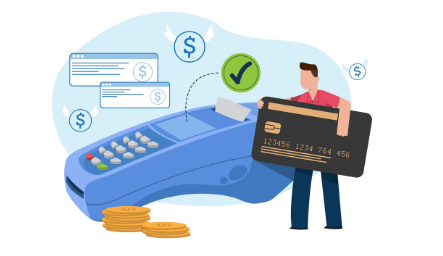| Overview: Merchant fees are charges paid by businesses when processing card payments. These include transaction, interchange, and processing fees. Knowing their types, how they work, and effective ways to reduce them is crucial for businesses aiming to cut costs while ensuring smooth customer transactions. |
Merchant Fees: The Hidden Cost of Convenience
In India, digital transactions have soared, with UPI alone processing over 19.47 billion transactions in July 2024. Alongside this growth, businesses face credit card merchant fees, typically ranging from 1.5% to 3.5% per transaction. While these fees seem minor individually, they accumulate significantly with high transaction volumes.
The knowledge of credit card transaction fees for merchants and how they are distributed between banks, card networks, and payment processors is essential for maintaining profitability in today’s competitive market.
What are Merchant Fees?
Merchant fees are costs businesses incur for accepting card and digital payments. These cover:
- Transaction fees – Per payment charges combining a percentage of the amount plus a fixed fee.
- Interchange fees – Non-negotiable charges paid to the issuing bank.
- Processing fees – Charged by payment gateways and processors for handling transactions.

| Important to know: Merchant fees are tax-deductible as business expenses in India, similar to other credit card charges. |
Types of Merchant Fees
Merchant fees are not uniform; they differ based on the nature of the transaction and the circumstances under which payments occur.
Universal Fees (always applicable)
- Transaction fees: A fixed + percentage amount for each payment.
- Interchange fees: Paid to issuing banks, vary by card type.
- Processing fees: For payment gateway infrastructure and fraud checks.
Situational Fees (apply in specific cases)
- Chargeback fees: Applied if a customer disputes a payment.
- Cross-border fees: For international transactions.
- Refund fees: Some providers retain original fees when refunds are processed.
How Merchant Fees Work?
Merchant fees are split among several players:
| Party Involved | Role in Transaction | Share of Fee |
| Issuing Bank | Issues customer’s card, earns interchange fees | % of transaction |
| Acquiring Bank | Merchant’s bank, adds markup | Variable |
| Card Networks | Visa, Mastercard, RuPay charge assessment fees | Fixed % |
| Payment Processor | Razorpay, Paytm, etc. manage gateways & security | Service fee |
| Example: For a ₹1,000 card payment at 2.5% + ₹0.30, the merchant receives ₹974.70. The remaining ₹25.30 is shared between banks, card networks, and processors. |
Real-World Impact of Merchant Fees
Consider a business processing ₹5,00,000 monthly.
| Pricing Model | Formula | Monthly Cost | Effective Rate |
| Flat-rate (2.9% + ₹30) | (₹5,00,000 × 2.9%) + fees | ₹29,500 | 5.9% |
| Interchange-plus (2.1% + 0.5%) | Split by base + markup | ₹13,000 | 2.6% |
Insight: Choosing interchange-plus over flat-rate could save over ₹16,000 monthly, which is important when considering credit card convenience fees.
Red Flags: Hidden Charges to Watch
Beyond standard fees, merchants often face hidden charges that can unexpectedly inflate costs if not identified and managed early.
- Monthly minimum fees if sales don’t cross a threshold.
- PCI compliance charges for data security obligations.
- Early termination penalties for contract breaks.
- Statement fees for monthly transaction reports.
| Mistakes to Avoid: Not reading processor contracts carefully often leads to hidden charges. |
How to Reduce Merchant Fees
Strategies to optimise credit card merchant fees include:
- Negotiate with processors: Leverage high volumes for lower rates.
- Promote low-cost payments: Encourage UPI or debit card use.
- Reduce chargebacks: Clear refund policies & strong customer service.
- Adopt AVS tools: To cut fraud and qualify for lower interchange.
- Use correct merchant category codes: Some industries enjoy lower rates.
| What You Must Know: UPI transactions usually carry the lowest merchant fees in India, cheaper than paying rent with a credit card. |
Airtel Axis Bank Credit Card—Relevance for Merchants
While merchant fees are unavoidable, choosing the right credit card can indirectly support businesses and individuals managing expenses. The Airtel Axis Bank Credit Card offers cashback and rewards on digital spends, including utility payments and online transactions. Merchants encouraging customers to use cost-efficient payment methods can complement such customer-friendly credit card benefits.
Choosing the Right Payment Processor
When selecting providers:
- Transparency: Clear pricing models without hidden charges.
- Security: PCI-DSS compliance, fraud detection, encryption.
- Integration: Seamless with e-commerce platforms and POS systems.
- Support: Responsive help for disputes or downtime.
| Facts to Know: Indian processors like Razorpay, Paytm, and PhonePe offer varied pricing, so comparisons are essential. |
Wrapping Up: Balancing Costs and Rewards
Merchant fees are an inevitable cost in India’s growing digital economy, often ranging between 1.5%–3.5% of transactions. By understanding types, working mechanisms, hidden charges, and ways to reduce them, businesses can safeguard margins while maintaining secure and seamless payment options for customers.
While optimising credit card transaction fees for merchants is key, individuals can also benefit from smart card choices. The Airtel Axis Bank Credit Card is a valuable option, offering rewards and savings on everyday expenses.
FAQs
Q1. What are credit card merchant fees?
Credit card merchant fees are charges businesses pay processors, banks, and networks for handling transactions securely and efficiently.
Q2. Why do credit card transaction fees for merchants vary?
They vary due to card type, transaction method, business category, and the pricing model offered by payment processors.
Q3. How can merchants reduce overall processing fees?
Merchants can negotiate rates, encourage low-cost payment methods, minimise chargebacks, and choose transparent processors for cost savings.
Q4. What hidden costs should merchants watch for?
Hidden costs may include PCI compliance charges, early termination penalties, statement fees, or monthly minimum fees imposed by processors.
Q5. Are credit card merchant fees tax deductible in India?
Yes, they are treated as business expenses, so merchants can claim them as deductible costs when filing annual tax returns.



